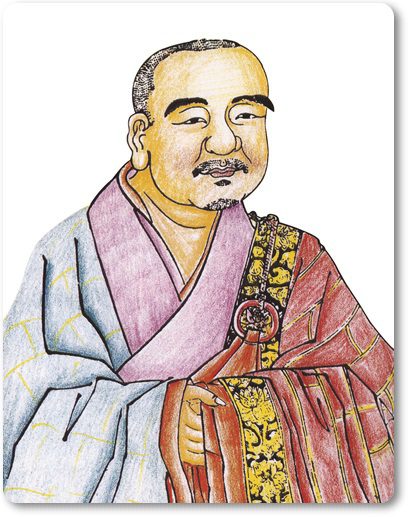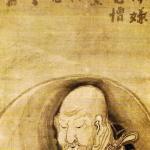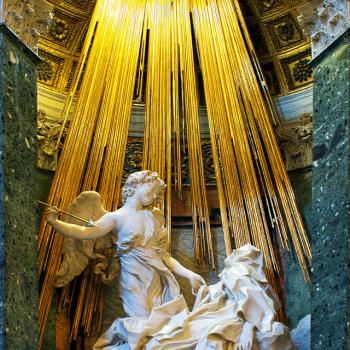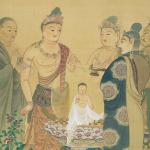The Japanese Zen community marks today, the 15th of October, as the anniversary of the day in the year 606, when Jianzhi Sengcan returned to that mystery from which all of us come and, as with that ancient venerable, to which all of us return.
In our Zen traditions Sengcan (Seng-ts’an in the older Pinyin transliteration and Sosan in Japanese) is the third Chinese ancestor, inheriting the dharma from Huike who inherited it from Bodhidharma.
We don’t really know a lot about him, the scant details of his life are recounted in the Lamp anthologies. His name is mentioned in the seventh century Further Biographies of Eminent Monks and the eighth century Records of the Transmission of the Dharma Treasure, but most details about him come from the thirteenth century Compendium of Five Lamps.
He is also traditionally named as the author of the Xinxin Ming, an early classic of the Zen way. More broadly it can be considered one of the great hymns of nonduality. The scholarly community generally believes Sengcan cannot have been the author as the poem almost certainly was composed considerably after his life.
Still, wrapped in mystery, we are invited to celebrate the monk and the poem on this day.
That poem, the title variously translated as Faith in Mind, or On Trust in the Heart, or Have Faith in Your Mind, or a Song of Enlightenment has invited numerous attempts at rendering into English. Last year I shared Stanley Lombardo‘s version. Today, Burton Watson’s…
Inscription on Trust in the Mind
by Seng-ts’an
Translation by Burton Watson
The highest way asks nothing hard,
but detests any picking or choosing.
Only do without love and hatred
and all will come clear and open.
With the smallest degree of differentiation, though,
things grow farther apart than heaven and earth!
If you want the Way right here before you,
have nothing to do with assent or dissent.
Where acceptance and rejection vie for mastery,
this is sickness to the mind.
Without comprehending the Dark Meaning
you strive in vain to still your thoughts.
The Way is round, a vast emptiness,
nothing lacking, nothing left over.
Only because you choose and reject
does it cease to be so.
Never tag after the realm of entanglements;
do not dwell in Emptiness either.
When mind achieves unity in repose,
all else will vanish of itself.
Mind moves, you return it to stillness,
but thus stilled, it moves all the more.
While you persist in two extremes,
how can you understand unity?
And where unity no longer reigns,
both extremes forfeit their merit.
Cast aside being and you find it swamping you;
pursue Emptiness and you stray farther from it still.
Much talk, much worry,
and you’re less than ever able to face things.
Be done with talk, and be done with worry,
and there’s no place you cannot pass through.
Return to the root and you’ll grasp the meaning,
but trail after lights and you lose their source.
For the moment shine your own light—
then you can master the Emptiness before you.
The shifts and turns of the Emptiness
all spring from deluded views.
No need to go seeking truth—
simply put an end to such views!
Dualism is no place to dwell;
take care, never go that way!
No sooner do we have “right” and “wrong”
than the mind is lost in confusion.
Two come about because of One,
but don’t cling to the One either!
So long as the mind does not stir,
the ten thousand things stay blameless;
no blame, no phenomena,
no stirring, no mind.
The viewer disappears along with the scene,
the scene follows the viewer into oblivion,
for scene becomes scene only through the viewer,
viewer becomes viewer because of the scene.
If you wish to understand both,
see them as from the first a single Emptiness,
a single Emptiness in which both are identical,
embracing all the ten thousand forms alike.
When you perceive things as neither coarse nor fine,
how could you favor one above another?
The Great Way is the soul of latitude,
nothing about it easy, nothing about it hard.
People of petty outlook are fretful, doubting;
the more they hurry, the more they fall behind.
Sticklers always miss the proper measure,
certain to set off on wrong roads.
Leave it! Let things take their course!
In the end there’s neither going nor staying.
Follow your nature, blend with the Way,
be free and easy, a stranger to all care.
Fetter your thoughts and you turn aside from truth,
sinking in darkness, no longer well.
No longer well, you wear out your spirit—
what use to covet one thing, shun another?
If you want to grasp the One Vehicle,
never despise the six senses.
So long as the six senses are not despised,
you’re at one with correct perception.
Wise men take no special action;
fools fashion their own shackles.
The Law knows no “this” Law or “that,”
yet you persist in your witless attachments.
Using mind to stir up more mind—
what grosser error than this?
Delusion breeds concepts such as “tranquil” or “disordered”;
enlightenment tells you there’s no good or bad.
All these pairs of opposites
spring from faulty reckoning.
Dreams, phantoms, empty flowers—
why trouble trying to grasp them?
Gain, loss, right, wrong—
throw them away at once!
When eyes do not close in sleep,
dreams vanish of themselves.
When the mind refrains from differentiation,
the ten thousand phenomena are a single Suchness,
a single Suchness dark in entity,
lumpish, forgetful of entanglements.
View the ten thousand phenomena as equal
and all will revert to naturalness.
The very basis of their being wiped out,
impossible to rate one above the other!
Arrest motion, and motion ceases to exist;
move stillness and stillness is gone.
But when neither comes into being,
how can even a single thing exist?
In the ultimate realm, the farthest extreme,
norms and standards no longer hold.
Once achieve true impartiality of mind
and purposive actions will cease completely.
All fret, all doubt cleansed
in the harmony and directness of true faith.
Nothing whatsoever remains,
nothing to be thought of, to recall.
In empty brightness your light shines of itself,
without labor to mind or sinew,
there in the place past reckoning,
beyond the ken of cognition or feeling.
The Dharma-realm of Suchness
knows no “other,” no “self.”
If you desire to approach and enter it,
only say to yourself “not two.”
Where there are “not two,” all is uniform,
nothing not enfolded there.
Wise ones of the ten directions
all make their way to this Source.
In this Source, no long or short time spans:
one moment is ten thousand years;
no “here” or “not here,”
all ten directions right before your eyes.
The tiniest is one with the huge,
all boundaries and realms wiped out.
The largest is one with the tiny,
extremes no longer to be seen.
Being—this is nonbeing,
nonbeing—this is being.
Any view at variance with this
must not be held!
One—this is all,
all—this is one.
When you can see in this manner,
what worries will not fade?
When trust and mind are not two,
not two, trust and mind,
there all words break off,
no past, no future, no now.
Here’s a lovely talk on the poem by Chan master Simon Child.















